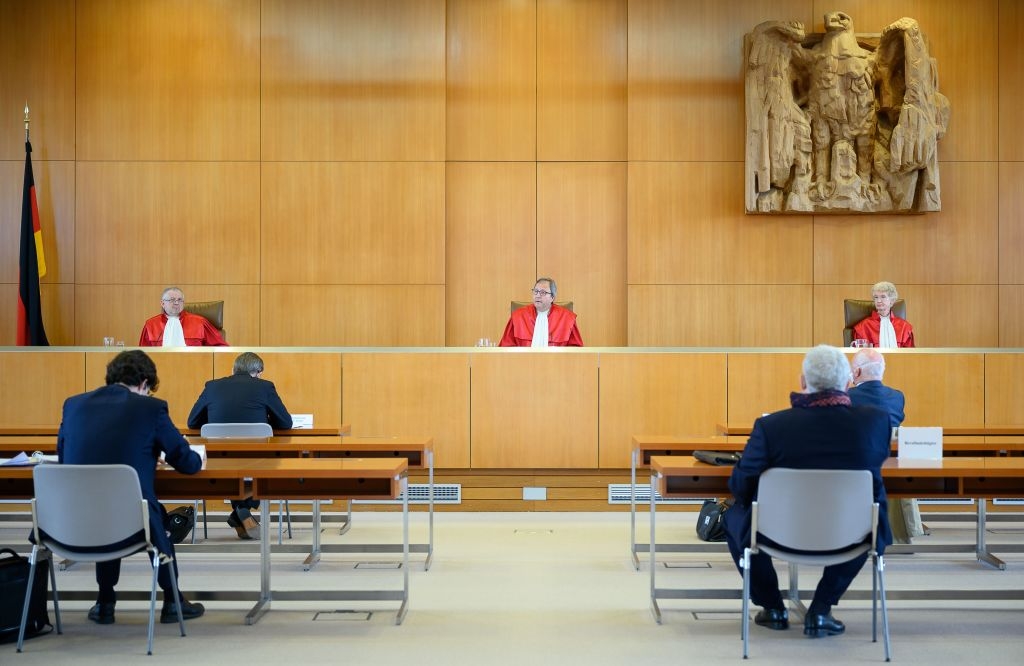In this mailing:
- Soeren Kern: Germany Takes Back its Sovereignty from the European Union
- Elisabeth Sabaditsch-Wolff: Ramadan in the Time of Coronavirus
by Soeren Kern • May 18, 2020 at 5:00 am
The seemingly obscure ruling... has called into question the legitimacy of the EU's supranational legal and political order.... The German court's ruling marks a new phase in the debate over the balance between national and supranational sovereignty.
The European Union is now engaged in a power struggle with its largest member state, Germany. The legal feud threatens to unravel not only Europe's single currency, the euro, but the EU itself.
"What amazes me is the one-sidedness and the zealous tone that is struck by some here. It is clear that the European Court of Justice has been claiming an unlimited precedence for European law for 50 years, but almost all national constitutional and supreme courts have objected to this for just as long. As long as we don't live in a European superstate, a country's membership is governed by its constitutional law." — Judge Peter Michael Huber, a member of the German Constitutional Court who helped write the ruling.
"One thing should never be forgotten: Europe is not a federal state, but a legal community developed from the founding core of an economic community in clearly limited areas of national sovereignty. Any sovereignty of the European Union is only derived from the sovereignty of the constituent member states." — Klaus-Peter Willsch, a member of the German parliament.

Germany's Constitutional Court has issued an unprecedented ruling that directly challenges the authority of both the European Central Bank and the European Court of Justice. Pictured: The judges of the German Constitutional Court in session on May 5, 2020 in Karlsruhe, as they issue their ruling on the European Central Bank's bond-buying program. (Photo by Sebastian Gollnow/Pool/AFP via Getty Images)
Germany's Constitutional Court has issued an unprecedented ruling that directly challenges the authority of both the European Central Bank and the European Court of Justice.
The seemingly obscure ruling, which seeks to reassert national sovereignty over bond purchases by the European Central Bank, has called into question the legitimacy of the EU's supranational legal and political order.
The European Union is now engaged in a power struggle with its largest member state, Germany. The legal feud threatens to unravel not only Europe's single currency, the euro, but the EU itself.
On May 5, the German Constitutional Court (Bundesverfassungsgericht, BVerfG) ruled that the European Central Bank's practice of buying vast amounts of government bonds, a monetary policy known as quantitative easing, is illegal under German law as neither the German government nor the German parliament signs off on the purchases.
by Elisabeth Sabaditsch-Wolff • May 18, 2020 at 4:00 am
Ramadan in war-torn Afghanistan is especially hard on the poor who suffer from malnutrition. Lockdown means no work: "If we can't work, we can't buy food and we will be fasting for 24 hours."

This year's Ramadan is impacted by the worldwide Covid-19 pandemic. Pictured: Worshipers wearing masks gather for Friday prayers at the Old Town Mosque in Sarajevo, Bosnia on May 8, 2020. (Image source: iStock)
It is this year's Ramadan. More than 1.6 billion Muslims worldwide are currently refraining each day from water and food from sunrise to sunset. The day of fasting is usually concluded by "Iftar", a communal breaking of the fasting by eating three dates, followed by a meal. The main focus of the daily Ramadan festivities is on the community, the gathering of family and friends. In recent years, Muslim societies in non-Muslim countries have extended their frequently grand Iftar-festivities to include politicians and other stakeholders. For instance, in 2019, the Islamic Faith Community of Austria organized an interfaith Iftar which included a speech by the mayor of Vienna.
|
|
No comments:
Post a Comment